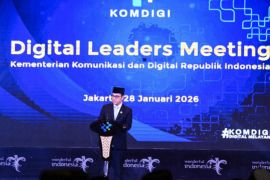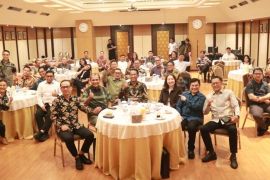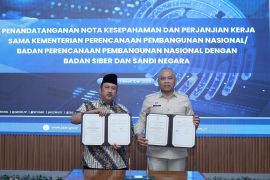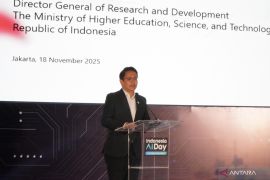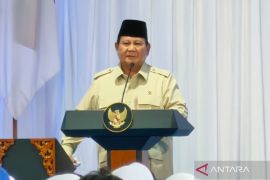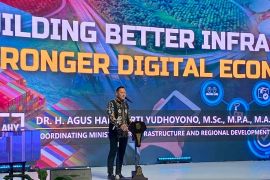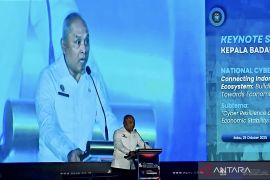Currently, the telematics sector has become an enabler of livings. The Electronic-Based Government System (SPBE) or Digital Government is starting to develop. According to reports, the government has spent quite a lot of money, but the utility has onJakarta (ANTARA) - Facilities and Infrastructure Deputy at the National Development Planning Ministry/National Development Planning Agency (PPN/Bappenas) Ir. Josaphat Rizal Primana, M.Sc. said digital transformation boosts efficiency across sectors, including implementation of government activities, public services, and education.
"As we know, information technology is developing more and more and allows for wider circulation. This development creates efficiency in time, cost, space, and others in the implementation of activities in government, education, and public services," Primana said as quoted from the Digital Transformation Virtual Expo 2022 held by the National Information and Communication Technology Council (Wantiknas), Thursday.
Primana remarked that digital transformation is the process of utilizing digital technology to create or modify business processes and culture to meet the changing needs.
"Digital transformation coordinates planning and budgeting for the development of 10 sub-major projects, including access and infrastructure, government services, education, health, trade, rural areas, cooperatives and Micro, Small and Medium Enterprises (MSMEs), digitalization of social assistance, industry 4.0, community digital literacy, Indonesia's digital resources, and cyber security," he remarked.
Related news: Inclusive digital transformation pursued under RI's G20 Presidency
Regulation on the digital ecosystem involves a variety of stakeholders, systems, and a mutually supportive environment. The regulation covers at least three related areas.
The first one is digital infrastructure and resource support, including data governance. The second is society, basic rights, digital governance, and the interaction of digital technology between the government, society, and other stakeholders. The third is the digital economy and the role of digital technology in increasing economic opportunities and efficiency.
Primana has called on the public to continue to remain optimistic that it is the right time and situation for Indonesia to accelerate digital transformation.
"Collaboration between the central government, regional governments, the private sector, and the community is an important step to accelerate this (transformation). New breakthroughs must be followed by serious efforts to compete, share, and synergize," he remarked.
Meanwhile, General Chair of the Telematics Society and Member of the Implementation Team Wantiknas, Sarwoto Atmosutarno, also spoke about the achievements and strategies for accelerating digital infrastructure development.
Related news: PIDI 4.0: A one-stop solution for digital technology adoption
"Currently, the telematics sector has become an enabler of livings. The Electronic-Based Government System (SPBE) or Digital Government is starting to develop. According to reports, the government has spent quite a lot of money, but the utility has only reached 30 percent," Atmosutarno noted.
"We see there are challenges for e-government regarding the need for a leadership system, which includes leadership commitment, facilities and infrastructure, as well as human resources. There is still ample room for overall improvement, so that implementation of the Electronic-Based Government System (SPBE) goes well. The law needs to appoint a National Chief Information Officer (NCIO) and merge the integration model of several data and information centers in Ministries or Institutions into the NCIO SPBE organization," he added.
Furthermore, General Chairperson of the Indonesian Internet Service Providers Association (APJII) Muhammad Arif Angga assessed that the development of connectivity still encounters difficulties, as Indonesia's territory is geographically unique, and there are still gaps among citizens.
Currently, he noted that the largest internet users in Indonesia are on the island of Java, at 41.7 percent, followed by Sumatra, at 16.2 percent.
"This rapid growth still leaves various problems, especially related to equitable access, which is constrained by geographical barriers and the distribution of the population that does not reach economies of scale," he stated.
To encourage even distribution of broadband access in Indonesia, the APJII has built the Indonesia Internet Exchange (IIX) Point to help improve the quality and efficiency of local internet connectivity.
"The ease of exchanging traffic between members allows network companies to shorten the distance of data traffic. With IIX at every location, interconnection between internet subscribers in Indonesia can be achieved easily and cheaply, so that the digital economy can grow more advanced," Angga noted.
Related news: Indonesia supports Nay Pyi Taw Declaration on digital transformation
Related news: Ministry lauds ASEAN digital transformation collaboration
Translator: Katriana
Editor: Fardah Assegaf
Copyright © ANTARA 2022

